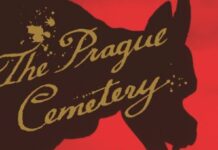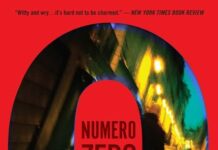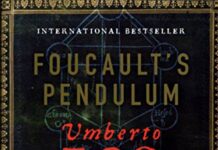
Ebook Info
- Published: 1994
- Number of pages: 472 pages
- Format: EPUB
- File Size: 1.16 MB
- Authors: Umberto Eco
Description
An international sensation and winner of the Premio Strega and the Prix Médicis Etranger awards, this enthralling medieval murder mystery “explodes with pyrotechnic inventions, literally as well as figuratively” (The New York Times).The year is 1327. Benedictines in a wealthy Italian abbey are suspected of heresy, and Brother William of Baskerville arrives to investigate. When his delicate mission is suddenly overshadowed by seven bizarre deaths, Brother William turns detective. His tools are the logic of Aristotle, the theology of Aquinas, the empirical insights of Roger Bacon — all sharpened to a glistening edge by wry humor and a ferocious curiosity. He collects evidence, deciphers secret symbols and coded manuscripts, and digs into the eerie labyrinth of the abbey, where “the most interesting things happen at night.”“Like the labyrinthine library at its heart, this brilliant novel has many cunning passages and secret chambers . . . Fascinating . . . ingenious . . . dazzling.” —Newsweek
User’s Reviews
Reviews from Amazon users which were colected at the time this book was published on the website:
⭐Umberto Eco reaches here a certain perfection in that type of historical novel on the early fourteenth century, though he does not try to explain in any way the reasons of the emergence of all the heresies dealing with poverty. The economic context is entirely neglected : two centuries of extremely important expansion based on the first agricultural revolution (a lot of cultivated land gained on the forests, the use of animal energy and work to till the land). This had caused a great expansion of the population and the development of cities, hence of commerce. This increase in population had made the crusades possible. But due to the inability to plan the demographic expansion and to develop the next stage of the agricultural revolution (rotation of crops, fallow fields and fertilizing) Europe is becoming overpopulated, with a great richness in a minority (including the church) and an ever wider section of society touched by poverty, famine, malnutrition, etc. The answer is religious : the church preaches total submission to the fate of man decided by God, and more and more orders or heretical groups preach the equalizing of society by imposing poverty as an ethic duty for all, particularly for the rich, preaching thus a redistribution of wealth, and going as far as a refusal of property seen as the cause of unequal society. The book starts with the debate on the poverty of Christ as a model for the church, and with this debate being recuperated by the new German Emperor to control the church and impose his authority on it. The Popes then flee from Rome and go to Avignon, where they are protected by the King of France. This level of the debate is richly illustrated by the book. The book is thus centered on those two levels : the theological, and partly social, debate on poverty and equality, and the struggle for power between the King of France and the German Emperor, and the impossibility for the Church to remain neutral and to become the real referee between the two monarchs. That leads to the heretical debate and the role of the Inquisition. The book leans toward the meaning that poverty is a necessary requirement to force humanity to reflect on its fate and its destiny, and it also leans toward the meaning that the Inquisition is not a real system of justice but an organisation of watchdogs that enables the church to eradicate those who would introduce debates inside the church. The method used by the Inquisition is very finely detailed and discussed : to destabilize the accused with the menace or the use of torture so that the Inquisitional judge appears as a saviour, a last recourse, and then this dependance towards the judge makes the accused play in the hand of the judge and then justifies the system and the accusation, not with real facts but with the acceptation of a lethal fate to escape suffering and questioning.Strangely enough, Umberto Eco adds an ever true theme in the book : the use and the necessity of knowkedge as the ferment and the engine of progress. Knowledge can only be found in the books of the past and subsumed through the observation of facts and the use of logics. Knowledge is a liberation of the spirit but also of the body, because it enables progress and better means to improve the lot of man on earth, through inventions and machines. This goes against the grain of a dogmatic approach of religion, supported by the Inquisition and the fight against heresies : if the Book, the Bible, is the absolute sum of true knowledge given by God to man, then man does not have to look for knowledge, look for new facts or interpretations, try to invent new machines or productive processes. On one side liberation through knowledge or science. On the other side submission to a closed text and interpretation of that text and the eternal repetition of it and submission to whatever life may bring, all of it being seen as the will of God or the making of the Devil. Then intelligence can only be used to decide what is on the side of God and what is on the side of the Devil and the Antichrist.The book does not close so many debates, but only tells us a story. The abbey is entirely destroyed, starting with the library, the largest library of christendom. The monks are hence either killed or scattered away and their knowledge is lost just like their books. What is interesting in the book is that it is entirely organised like a thriller and guided by the Apocalypse, by the Book of Revelations. So we discover little by little a fierce fight for power within the abbey, and the criminal planning of a blind and fundamentalistic monk who prefers killing other monks and destroying the whole library for one book not to get into the hands of anyone, the second part of the Poetics by Aristotle. Fundamentalism leads to crime, and even crimes against humanity. This book is thus tremendously modern and strong. It is also sad, not because knowledge always succeeds (which would not be sad really, except for the fundamentalists), but because knowledge always encounters resistance and rejection. There is no way to see knowledge be recognized at once, and the field of knowledge is a fierce battle field for power among those who should defend only truth. They only defend their own personal truth that ensures them to keep their power or conquer new powers.Dr Jacques COULARDEAU, Paris Universities II and IX.
⭐I’m fascinated by publishing phenomenons – books that just take over the public imagination. Sometimes you read them and you understand how they became a hit (the Harry Potter series); sometimes you may not like them but you can see why people love them (Twilight, The Da Vinci Code). But other times, what you get is something truly unlikely, such as The Girl with the Dragon Tattoo, which I loved but is also a Scandinavian book about female empowerment that takes over 100 pages to get going, is filled with foreign names, and meanders its way around its story in an unorthodox fashion. (I really liked that book, but it’s a truly bizarre best seller.)But if The Girl with the Dragon Tattoo is an unlikely bestseller, The Name of the Rose is positively bewildering in its success. Here’s a book that immerses you deeply in medieval life, gets into complex debates about medieval theology and 14th century schisms in the Catholic church, goes on page-long diversions into church art and the construction of manuscripts, features frequent interludes of untranslated Latin, and does all this while absolutely refusing to hold the reader’s hand at all. Yes, there’s a murder mystery at the book’s core, and a lot of intrigue, and even a bizarre labyrinth and dream sequences, but this isn’t what anyone would call an easy read.And yet, somehow, I couldn’t put this down, despite my occasional frustrations at Eco’s discursive style, complicated subject matter, and overall verbosity. Or maybe I enjoyed the book because of those things, because whatever else you say about The Name of the Rose, the fact remains that the book immerses you in the medieval era in a way that almost nothing else ever has. No, Eco has no interest in helping you navigate the text, nor its debates and themes, because the characters themselves are already immersed in this world, and they don’t need to explain things to each other. Instead, Eco wants you to live in this world, see it through the eyes of contemporaries, and go back to a different time.The result is a book that’s really hard to fit into any traditional genre classifications. Is this a murder mystery? Undeniably, with a series of grisly murders, unclear motivations, a possible conspiracy, mysterious labyrinths containing secrets, and a constant sense of danger (to say nothing of a Sherlock Holmes surrogate in the form of a monk). But to label it a mystery doesn’t work, because no mystery would have this much debate about the role of poverty and material possessions in the Catholic Church, or a debate as to the legitimacy of the Pope, an element of the book that’s given equal weight as the murders, and discussed possibly in more depth.So is it historical fiction? Maybe so…but it’s also weirdly metafictional at times (with a playful prologue that establishes the book as a half-remembered re-creation of a manuscript that might or might not be fake), interested in the minutiae of theology and monastic life, all while being a thriller, but one that only seems partially compelled to follow the murder thread. It’s a truly odd book, and one that really had no business being as popular as it was, if you subscribe to publishing wisdom – it’s difficult, takes forever to get going, doesn’t hold the reader’s hand, and more.But while you’re under its spell, none of that really matters, in the end; if the goal of a book is to transport you to another place or time, The Name of the Rose does that incredibly well. It’s not always “fun”, it’s not always fast-paced, but it’s immersive in a way that few books manage to be – and that, in of itself, is something worthwhile all on its own.
⭐Brilliant, just as remembered, and very different and BETTER than the film. Among them are expected differences, like more time to explain, and more time to develop character, but also there are things that never happen in the film, and even complete 180 degree turns to key events. The book is a better more holistic and satisfying event than the film, but the film, seen as a film, stands well as a great piece of cinematography. just not a great version of the book. See the film, but read the book first, if you can. Umberto Eco is a master of deep and meaningful plots and story lines, and casually throws around languages like Latin, Greek, German, Italian and others, sometimes untranslated, which can be disorientating at times, but does definitely enhance the time difference and cultural gap between us and the period of the book in history. Brilliant all round.
⭐I’ve seen the film starring Sean Connery, and thoroughly enjoyed it.I tried watching the more recent TV adaptation, but felt it went off on a tangent that I couldn’t fathom.So I thought it was time I tried reading the book.I’ve often found the book to be vastly superior to any screen adaptation – but not in this case!I struggled through the first few chapters – but finally gave up after trying to work out the meaning behind the conversation between William and Umbertino (15% into the book, according to my Kindle).The dialogue between characters – and the descriptions of places (I’m still trying to work out exactly what the novice was seeing when he walked into the church – presumably a stained-glass window?) – went completely over my head; and this is coming from someone who studied English to A-level standard at school!Perhaps this is just a bad translation from the original Italian into English.Perhaps if the translator had bothered to translate the Latin into English as well, I could have persevered more – but not even knowing the meaning behind huge chunks of text did not help!I was expecting an historical “whodunnit” – but this seems to be more of a treatise on medieval theology.There’s probably a good story in there somewhere, but I couldn’t be bothered to dig it out.I don’t normally agree with the idea of abridged versions of novels, but in this case, such an edition would have been far easier to read.
⭐I approached The Name of the Rose with some trepidation. It was a thick paperback, and it came with a reputation of being a challenging read… and a few pages in it became clear that the author had liberally scattered his text with what I am told is medieval Latin (I don’t know any kind of Latin except for phrases which have passed into common use like Veni, vidi, vici).However, I decided I would tackle the challenge as I also knew it was a mystery novel and, in general, I enjoy mystery novels (unless they are too graphic).The Name of the Rose is a mystery novel, but it is a medieval mystery novel, set in a monastery against a background of a theological debate, and I found that I was as caught up in trying to follow the religious arguments (and form my own opinion of them) as I was by solving ‘whodunit’? In fact, by about half way through the novel I was so caught up in the story that I forgot to look out for clues as to the murderer’s identity… which meant I had a big surprise at the end.At the heart of the monastery, and at the centre of the novel, is the mysterious library – a labyrinth which can only be accessed by the librarian and his assistant. Like all forbidden or restricted things, curiosity drives others to long to penetrate the library’s secrets – unfolding a devastating chain of events.The Name of the Rose is a novel about sincere monks grappling with what seem to them to be vital questions: Did Christ practice (and preach) a rule of poverty for Himself and His followers? What should the relationship be between the (Catholic) church, the Emperor, and the common people? And, perhaps most important of all, Did Christ ever laugh? While these may not be questions which are asked in modern religious circles, what struck me was how the monks holding differing views used their religious beliefs in order to support political arguments – a trend as old as the monasteries of the Middle Ages and as modern as the American Presidential elections.The other theme in The Name of the Rose is about the importance of knowledge, and particularly the information stored in books, and about whether access to that learning should be free for all or restricted. Is all knowledge good, because it is knowledge, and should therefore be shared, or are there some things which it is better to keep a secret?You don’t have to be religious to enjoy this book – although I think it adds an interesting dimension if you are – neither do you have to be an expert on medieval times. If you have the patience to grapple with complex events (while remembering that the precise details are perhaps, not vital to the story), and the desire to read a novel that elevates the basic ‘whodunit’ to an art form, then add The Name of the Rose to your reading list, and persevere until the end. You will not be disappointed (but you may wish to read it again, to see if there were clues you missed the first time around).
⭐This is a very difficult book to read and a difficult book to review. We got off to a bad start (the book and I, that is). For me, there is an overweening arrogance in deliberately making the first 150 pages difficult to get through. I wouldn’t have minded as much if this was the end of the difficulties but it was not. For me personally, there are three main areas of difficulty in terms of both understanding and in the desire to keep reading:1. Frequent use of untranslated passages. Mostly Latin, but also Medieval Spanish, French, German and Italian. As a reader, there is a dilemma. Do you refrain from interrupting reading and hope to infer the meaning, or do you attempt to get a translation, thus constantly interrupting the flow? I tried both options, neither were completely satisfactory, but on the whole, the second was preferable. I did think of writing the translations in pencil in the margins so that a re-read would be easier, but I’m not sure I have it in me, to be honest.2. Keeping track of the various factions, many of whom I had not previously been aware of: the Fransicans, Benedictines, Dontatists, Albegensians, Bogomils, Minorites etc etc, and all their various followers; the theological arguments about poverty or whether or not Christ laughed would have been OK on their own, but I struggled to keep track of it all. I think you would need to be a 14th Century scholar or at least a Medieval expert to follow it all. Oh, just like the author!3. The pacing. Just when you thought the story was picking up, the story goes off at an interminable tangent and it takes far too long to get back to the point of interest. For the sake of spoilers, I won’t give any examples.I am not convinced that the ending was a decent enough pay-off for the above and reading the author’s Postscript did nothing to change my mind that the author is too clever by half and very pleased with himself. My thanks to DailyKos.com (who clearly loves the book) for help in understanding anything at all.N.B Amazon won’t publish my review with the link to the above website, but hopefully credit still goes where it is due, and it is still helpful enough for others to find if needed.
⭐First of all, this is a fantastic book that I highly recommend anyone and everyone to read. At its heart, it is a gripping detective mystery with a great story and cast of highly developed and believable characters. However, Agatha Christie it is not…It’s become somewhat cliche to say that Umberto Eco does not pander to his readers, but this is an important characteristic of his to be aware of. In fact, in the essay that accompanies The Name of the Rose, Eco openly admits that he rejected calls from editors to shorten the first hundred pages, which are described as difficult and demanding, as he wanted to challenge the reader. He states openly that if a reader is unable to pay the ‘penitence’ of the first 100 pages, then they will never make it through the whole novel. Personally, I’ve known a few people balk at reading any of Eco’s novels, but I believe that The Name of the Rose should be seen as challenging as opposed to difficult.Arguably the most remarkable aspect of the novel is the many different levels that it works on, which was of course intentional. Despite escapism being something of a dirty word in the world of literature, Eco made no secret of the fact that he wanted The Name of the Rose to be entertaining – and it is. It can simply be read as an engaging – albeit challenging – murder mystery, nothing more nothing less. On this level, it ticks every box: a hermetically sealed environment, a defined list of suspects, a trail of clues, and plenty of red herrings.On a second level, The Name of the Rose serves as a very credible chronicle of the Middle Ages, with enough research and information to make your head spin. Eco relied heavily on manuscripts to inform the dialogue of his medieval monastery and there are pages and pages devoted to historical background. Personally, I felt that I was more in line with this level on my second read through. But be warned, the various Franciscan factions and the relationship between them, the Holy Roman Emperor and the Avignon Papacy is not the easiest thing to keep track of so expect to do some background reading.The other level that the novel works on, inevitably, is in the study of signs. Of course, this is only natural, as signs are an essential part of the detective fiction paradigm, but Eco, as a leading thinker on the subject of semiotics, goes well beyond the usual metonymic clues. He introduces us to the subject early on, in what is effectively a medieval version of semiotics 101. The theme of signs occurs again and again, from religious symbology to linguistics. I can’t pretend to have picked up on much of it, but for an advanced reader, The Name of the Rose is a genuine work of literature to be dissected over numerous readings.It’s tempting to view the Aedificium, with its three floors, as representative of the three levels of the novel and, having read the accompanying essay, I wouldn’t be surprised if that were the case. On that note, I’d also highly recommend reading the essay at the end of the Vintage edition – it serves as a real eye-opener to Eco’s creative process.I’d definitely recommend The Name of the Rose. It’s not the easiest read, but the prose is clear and uncluttered and regardless of its complexity, it is very entertaining. If nothing else, reading the novel and Googling Umberto Eco will at least furnish you with the basic skills for writing overly long, pretentious reviews on Amazon.P.S No part of this review was intended to be anyway disrespectful to the Queen of Crime.
Keywords
Free Download The Name of the Rose in EPUB format
The Name of the Rose EPUB Free Download
Download The Name of the Rose 1994 EPUB Free
The Name of the Rose 1994 EPUB Free Download
Download The Name of the Rose EPUB
Free Download Ebook The Name of the Rose



